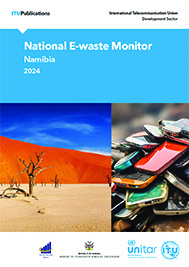 | This report summarizes the outcomes obtained from the application of the international framework to measure e-waste statistics and from the use of e-waste tools as Namibia currently lacks the capacity to monitor e-waste quantities. Namibia faces two key challenges in terms of national e-waste recycling: large geographical distances to facilities and comparatively low current awareness among citizens. Other challenges include increasing volumes of e-waste, competition with the informal sector, absence of an established regulatory framework (in development), and lack of financial investments. Namibia has ratified several international and regional conventions and agreements related to environmental management, which are also of relevance for e-waste. Namibia must establish integrated waste management infrastructure for the collection and dismantling of e-waste backed by technical standards and guidelines, and construct new or repurpose existing waste drop-off, pre-treatment, dismantling, and disposal sites. The final goal of this report is to develop a roadmap and recommendations to improve e-waste data quality and availability in Namibia. Table of contents
|
|